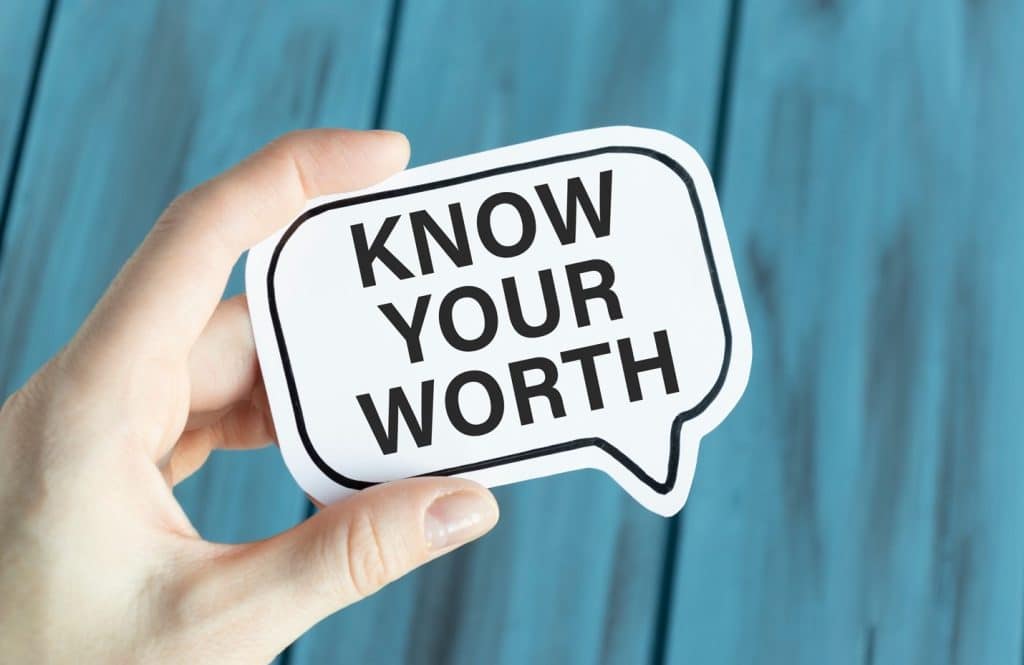One of the most difficult aspects to manage when running a coaching business is to understand how much to charge for your services. We explain everything you should take into consideration.

This is a topic that is near and dear to my heart. Throughout my career as a personal trainer, I would often get asked for free fitness programs, advice, or my ‘opinion’ on a variety of fitness-related questions. As an example, and on the surface, a question such as, “What is a good core exercise?” is seemingly benign. However, right under the surface, there is a much bigger issue at hand… value.
When I first started my career in the fitness industry, I would answer fitness-related questions freely and often with enthusiasm. However, as my experience and credentials grew, I began to understand and appreciate my value, and while not to be a jerk, I would typically decline such questions and would instead offer a paid consultation.
My primary point of contention?
What makes me any less professional than an individual in another field and therefore, why should I be compelled to give away my hard-earned knowledge for free?
An Unregulated Industry
A common theme between fitness/personal training and coaching is that both industries are devalued – often to a level that I consider criminal. But why is this?
For what it’s worth, the coaching (and fitness) industry is the wild west. This is primarily because there is no regulation whatsoever. Does being a coach require a degree? No. Does being a coach require a license? No. Does being a coach require a certification? No.
While I could spend hours discussing this topic, the key takeaway is that due to the lack of regulation, I am of the opinion that coaching is often not considered a ‘professional’ profession. As such, anyone (and I mean anyone!) can dispense with coaching advice and therefore, the value of said advice is minimal.
I understand that this is coming across a bit ‘rant’ish,’ however, I believe it’s an important topic to discuss. I once had a NYC-personal training client (partner at a top law firm) request me to lower my rate. At this point in my career, I had over 20-years experience, a degree in Kinesiology, multiple certifications and had worked at the top commercial and corporate facilities in NYC. So I flat-out declined and further, I asked if he would ever lower his hourly billable rate. He replied that he would not because he was one of the best in his particular area of law practice. I responded so am I, and I would not lower my rate. End of discussion. As a point of context, he billed $1100/hour… 10x my rate!
Getting back to the unregulated industry topic, I’m guessing that if personal training were regulated, the client would have been less inclined to ask for a discount. Whether it be a higher industry reputation, more respect or greater knowledge of the industry as a whole; the fitness industry would not be as devalued as it is currently if it were regulated.
What Do You Offer?
To determine your value, you must know what you offer to prospective athletes/clients. Below are some variables:
- Experience as a coach
- Experience in the industry/sport
- Education/credentials
- Services offered
The more experience and education you have, generally, the higher the rate you can charge. Additionally, the more services you offer, the greater the rate you can charge as well.
What Does ‘Professional’ Mean?
It must be said that value isn’t just tied to experience, education and services provided – as noted above, it is also about being a professional. For a good part of my fitness career, I was a fitness manager and general manager of large fitness facilities in NYC. During that time, I sadly came to the realization that what I considered ‘standard practice’ in terms of professionalism was not standard at all. In fact, the far majority of those that got written up and/or terminated were due to basics of any job – show up on time, reply in a timely manner to communications, do your job-related tasks with a high level of quality, provide excellent customer service, etc…
I note this because unfortunately, the bar within the coaching and fitness industries is fairly low with respect to the aforementioned areas. Therefore, if you are a true professional who provides excellent customer service and goes above and beyond for your athletes, this is part of your value.
Market Value
If you are coaching in person, the local demographic will greatly influence your rate. For example, let’s say that you could clone yourself, and one of you is in San Francisco, and the other one of you is in Ashtabula, Ohio. Despite your knowledge and experience is the exact same, you could likely charge two to four times more in San Francisco than you could in Ashtabula.
However, if you’re primarily coaching online, then your coaching rate will likely be more influenced by what you perceive your value to be and what other online coaches charge.
The point of this section is that while it’s crucial to know your value and thus not devalue yourself, you also have to be sensitive to what the market will bear and scale your rate accordingly.
Don’t Devalue Yourself
In creating UESCA’s certifications and other products, we seek out the top individuals in specific areas to produce this content. In doing so, I’ve found two things to be true:
- Top individuals are in demand and thus hard to collaborate with due to their other obligations
- Top contributors don’t come cheap
Regarding #2, in a small number of cases, UESCA was not able to collaborate with individuals due to their rate being too high. However, this is not good or bad – it’s just the way it is. I would never ask a potential contributor to lower their rate no matter how much I wanted to work with them. Perhaps this is because of my personal experience, but understanding that I was approaching the best of the best, I came into the discussions knowing full well that UESCA might not be able to afford their rates… and that is OK.
But here’s the key takeaway… of the contributors that UESCA could not afford to work with, not one of them offered to lower their rate – and good for them! They know their value and potential partners can either pay their rate or not.
So how do you know if you priced your rate in line with your value? In my personal experience, it’s when you’re able to tell someone your rate and be 100% comfortable with it and be able to explain to the potential athlete why your rate is what it is, if asked.
Don’t Compete on Price

There will always be coaches that charge next to nothing, and coaches that charge exorbitant rates. As such, pricing works very much on a bell curve. Aiming to underprice your services for the sole reason of athlete acquisition is very risky, and poor strategy. Conversely, pricing your services extremely high for the sole purpose of trying to set yourself apart from others is equally risky and likely without merit.
As noted previously, you must factor in local demographics if coaching in-person and to a degree, the average costs of coaching online – however, after taking those things into consideration, your pricing should reflect your value and nothing else.
What Are Your Credentials Worth?
This is a hard, if not impossible question to answer. What is a running certification worth? An extra $10 per session? Who knows. What are five years of coaching experience worth? Again… who knows. Quantifying specific metrics such as education and experience to a set dollar amount is not practical since the value of these things is very much subjective based on the individual.
Moreover, just because you acquire a new certification or have another year under your belt of coaching does not necessarily mean that your coaching rate should increase accordingly. In fact, more the likely, they should not.
The point of this section is that you should not view each piece of education acquired, or each year of coaching gained as a reason to increase your rate. Remember, staying on top of your education is not going above and beyond as a coach… it is expected. Rather, with respect to setting and/or increasing your rate, you should view your education and experience in totality and base your value on that from a macro point of view.
Summary
Knowing your value as a coach is critically important for success. Remember, it’s one thing to say your value is XYZ, and it’s a whole other thing to actually believe it. You must believe in your value as a coach and therefore, your associated rate(s). It’s totally normal to be in the weeds when starting out and trying to determine your value since you have no benchmark to go off of, but hopefully this post will help in this determination.









excellent write up!!
I literally made this my WhatsApp status this week before reading the article. I know the countless hours, time and energy I have put in, to become who I am today and finding that balance between what feels right and wrong has been an incredibly valuable lesson.
You’ve got the words on the focal point of the coaching industry and how it is perceived by mostly of the non coach ! thanks for the writting ! Regarding the regulation topic, I just want to highlight that in some countries like France, if you want to get the “professional card” (and all what is linked to this one, ex : insurance purposes, coaching in fitness clubs…) you need to pass a specific diploma managed by the ministry of education. It’s a barrier to entry that strongly regulates part of the “classical” coaching market but it also has negative points (old conventionnal teaching, non fiteable for those who wants ro reconvert…)